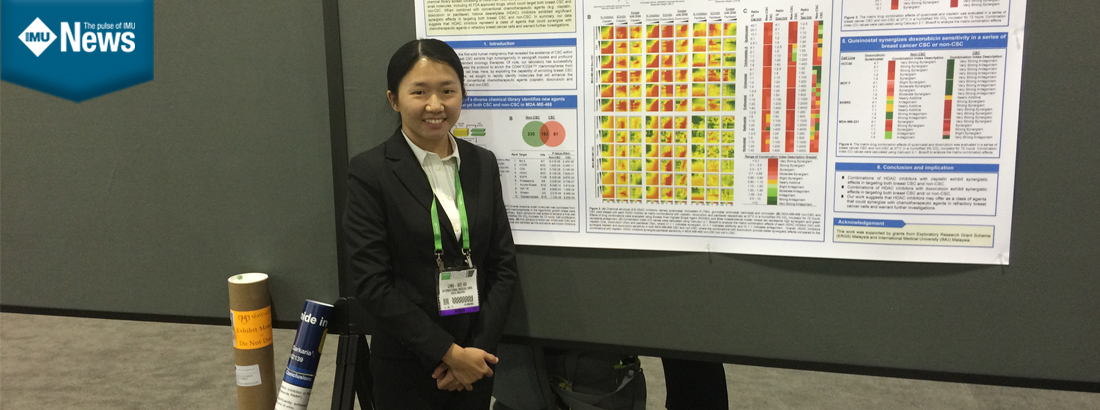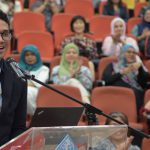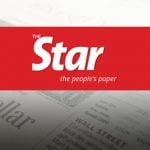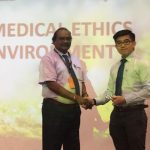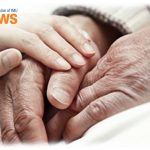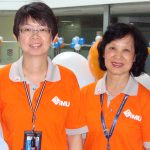Hii Ling Wei fueled her passion for research during her final year project in her undergraduate pharmacy degree. Her two-year working experience as a pharmacist under government setting had further augmented such passion where she had been actively involved in diabetic related researches about pharmacist-managed Diabetes Mellitus Medication Therapy Adherence Clinic (DMTAC) in Tawau Hospital. 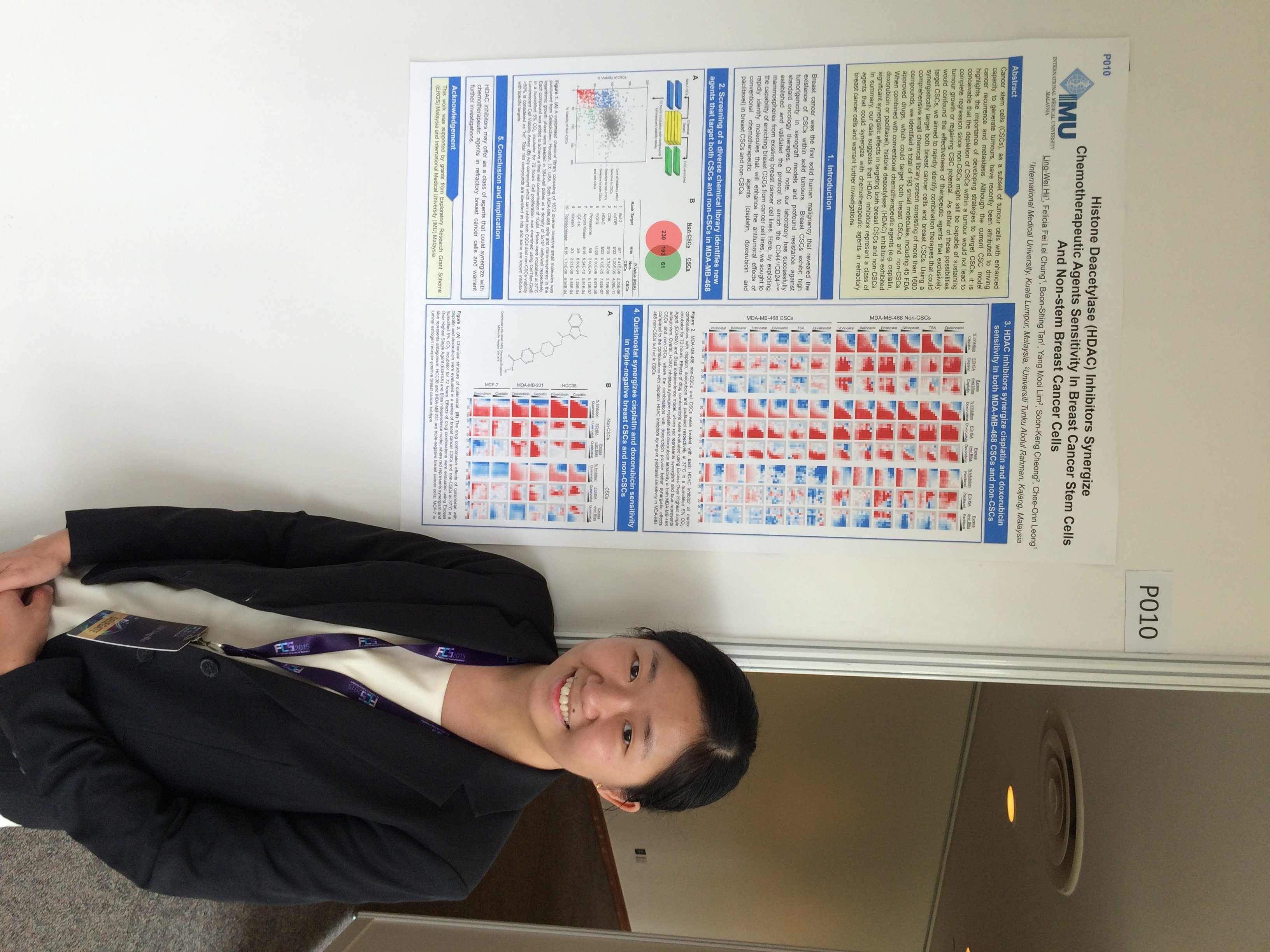 Moreover, Ling Wei’s role as a Therapeutic Drug Monitoring (TDM) and clinical pharmacist had offered her opportunities in training pharmacy assistant students and junior pharmacists, which had uncovered her interest in teaching. This has led to her decision to continue her MSc at IMU with the hopes of advancing her professional career by enhancing her critical thinking skills in research and academia. For her postgraduate studies, Ling Wei’s research was aimed at developing therapeutic strategy to target both breast cancer stem cells (BCSCs) and the non-breast cancer stem cells (non-BCSCs). Since current strategies that inhibit either BCSCs and non-BCSCs are known to be ineffective forcomplete breast cancer eradication, her study discovered more than 190 potential compounds that can inhibit both BCSCs and non-BCSCs. Moreover, her study further identified the potential of repurposing a class of bioactive compounds that involve several FDA-approved drugs as combinatorial cancer therapeutics. Her study showed that if these drugs are given together with clinically used anti-cancer agents, they will not only enhance the efficacy of anti-cancer agents in killing both BCSCs and non-BCSCs but will also lower the toxicity risk from these anti-cancer agents. Ling Wei has since completed her research project, done her viva and submitted her hard bound theses. She graduated with her MSc in April 2017. “This research had exposed me to a different level and experience in exploring my strengths in cancer therapeutic discovery, as well as cancer and stem cell research. While conventionally researchers are more focused to synthesise or look for novel compounds as a whole new drug, this drug discovery project had offered me new perspective that repurposing the FDA-approved drugs for new indications can be of useful in accelerating the discovery and development of new cancer therapeutic strategies too.”
Moreover, Ling Wei’s role as a Therapeutic Drug Monitoring (TDM) and clinical pharmacist had offered her opportunities in training pharmacy assistant students and junior pharmacists, which had uncovered her interest in teaching. This has led to her decision to continue her MSc at IMU with the hopes of advancing her professional career by enhancing her critical thinking skills in research and academia. For her postgraduate studies, Ling Wei’s research was aimed at developing therapeutic strategy to target both breast cancer stem cells (BCSCs) and the non-breast cancer stem cells (non-BCSCs). Since current strategies that inhibit either BCSCs and non-BCSCs are known to be ineffective forcomplete breast cancer eradication, her study discovered more than 190 potential compounds that can inhibit both BCSCs and non-BCSCs. Moreover, her study further identified the potential of repurposing a class of bioactive compounds that involve several FDA-approved drugs as combinatorial cancer therapeutics. Her study showed that if these drugs are given together with clinically used anti-cancer agents, they will not only enhance the efficacy of anti-cancer agents in killing both BCSCs and non-BCSCs but will also lower the toxicity risk from these anti-cancer agents. Ling Wei has since completed her research project, done her viva and submitted her hard bound theses. She graduated with her MSc in April 2017. “This research had exposed me to a different level and experience in exploring my strengths in cancer therapeutic discovery, as well as cancer and stem cell research. While conventionally researchers are more focused to synthesise or look for novel compounds as a whole new drug, this drug discovery project had offered me new perspective that repurposing the FDA-approved drugs for new indications can be of useful in accelerating the discovery and development of new cancer therapeutic strategies too.”
“This research also helped to lay significant ground work for my knowledge in developing drug combination strategies. Most importantly, this research had enabled me to have invaluable guidance and immense expertise from great supervisors, and also earning precious friendships with fellow researchers in our laboratory.”
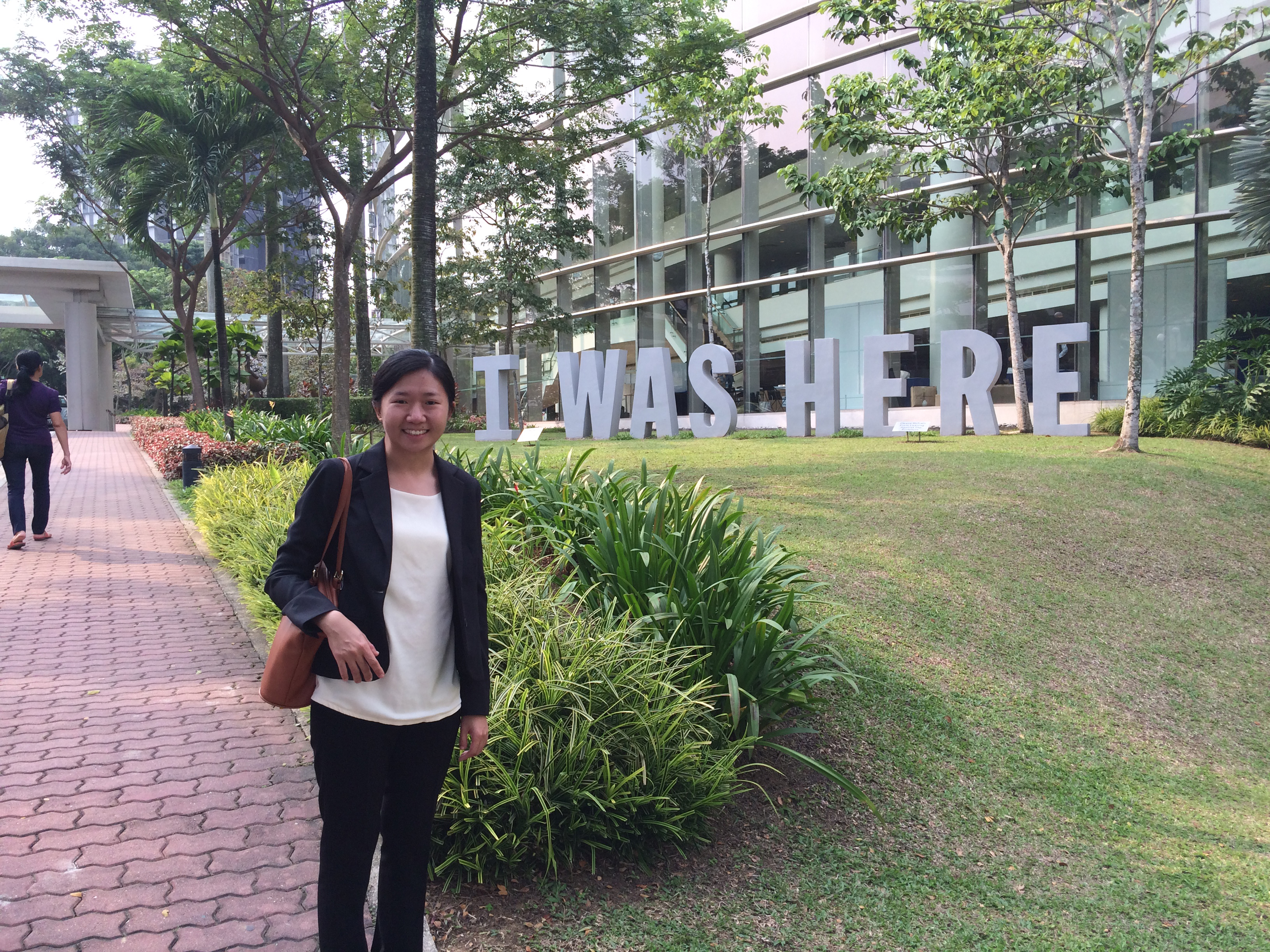 Ling Wei explains further on her experience presenting a paper in the US. How did you get your paper presented in US? The opportunity to attend American Association of Cancer Research (AACR) Annual Meeting 2015 was granted by my supervisor, Prof Leong Chee Onn. He recommended me to register and share my findings in this conference, whereby my abstract had been scheduled for presentation in a Poster Session at the AACR Annual Meeting 2015 in Philadelphia, PA and it was published in the 2015 Proceedings of the American Association for Cancer Research. Describe your experience presenting a paper in the US
Ling Wei explains further on her experience presenting a paper in the US. How did you get your paper presented in US? The opportunity to attend American Association of Cancer Research (AACR) Annual Meeting 2015 was granted by my supervisor, Prof Leong Chee Onn. He recommended me to register and share my findings in this conference, whereby my abstract had been scheduled for presentation in a Poster Session at the AACR Annual Meeting 2015 in Philadelphia, PA and it was published in the 2015 Proceedings of the American Association for Cancer Research. Describe your experience presenting a paper in the US  The AACR Annual Meeting covered the cancer research spectrum from the bench to the clinic. Indeed, this annual meeting had been a fascinating eye-opener for me, as it gathered an outstanding roster of speakers, hundreds of invited talks, and more than 6,000 proffered papers from researchers all over the world. This annual meeting highlighted the latest, most exciting discoveries in every area of cancer research, providing me a unique opportunity to update, meet, interact, and share my insights with other investigators from all over the world. Along with the meeting theme that year – “Bringing Cancer Discoveries to Patients”, I learnt the vital and inextricable link between discovery and treatment. By reinforcing the fact that research underpins all the progress we are making in the field toward cancer cures, this annual meeting managed to inspire me with ideas, people and moments that would provide me with renewed energy and motivation in my work. Going through the presentations and people in the annual meeting have taught me so much more than stuff about cancer research, they have taught me how to be me, to be innovative, self-motivated with critical thinking. In short, this conference had not only enriched my experience to meet with a diverse background of researchers, but also reminded me the importance of forming a comprehensive and multidisciplinary team in order to make astounding progress in the fight against cancer. Was this partially or fully sponsored by IMU? Partially sponsored by IMU.
The AACR Annual Meeting covered the cancer research spectrum from the bench to the clinic. Indeed, this annual meeting had been a fascinating eye-opener for me, as it gathered an outstanding roster of speakers, hundreds of invited talks, and more than 6,000 proffered papers from researchers all over the world. This annual meeting highlighted the latest, most exciting discoveries in every area of cancer research, providing me a unique opportunity to update, meet, interact, and share my insights with other investigators from all over the world. Along with the meeting theme that year – “Bringing Cancer Discoveries to Patients”, I learnt the vital and inextricable link between discovery and treatment. By reinforcing the fact that research underpins all the progress we are making in the field toward cancer cures, this annual meeting managed to inspire me with ideas, people and moments that would provide me with renewed energy and motivation in my work. Going through the presentations and people in the annual meeting have taught me so much more than stuff about cancer research, they have taught me how to be me, to be innovative, self-motivated with critical thinking. In short, this conference had not only enriched my experience to meet with a diverse background of researchers, but also reminded me the importance of forming a comprehensive and multidisciplinary team in order to make astounding progress in the fight against cancer. Was this partially or fully sponsored by IMU? Partially sponsored by IMU.
Ling Wei believes that studying in IMU had not only taught her professionalism, ethics and personal development, but also trained her to become a competent professional with skills in critical thinking, problem-solving and research. It also enabled her to work with a comprehensive and multidisciplinary team, aiming for astounding achievement for better healthcare.
Ten years ago, Ling Wei started her studies in pharmacy at IMU and graduated in 2011. She underwent her provisional training in Tawau Hospital, Sabah as Provisionally Registered Pharmacist (PRP) after graduation. Once Ling Wei was a fully registered pharmacist which is recognised by Pharmacy Board, Malaysia in 2012, she had been appointed as the Head of Department in Clinical Pharmacokinetics Service – Therapeutic Drug Monitoring (TDM), and also clinical pharmacist for orthopaedic ward in Tawau Hospital. Recalling fondly of her time studying pharmacy at IMU, Ling Wei said, “There were so much memorable moments along my BPharm life, for instance our semester trips, festive celebrations, class party and our futsal champions league. Among them, a two-day celebration that commemorated the past prime ministers’ contributions and the country’s achievements for our Malaysian Studies module is one of the most memorable moments at IMU with my B107 batch mates. Our event was in conjunction with the upcoming Merdeka Day and was themed ‘Down Memory Lane’.” “We had not only worked together to collect 1178 aluminium cans to build an 8.5 feet re-creation of the KL Twin Towers as one of the main decorations, but also putting efforts to prepare different traditional performances as well as setting up booths for food fair. Following the two days of fun-filled performances, we also united to perform a unique dance called ‘Jai Ho’ to end this event, which almost the whole of B107, were clad in traditional costumes, dancing together and having fun at the same time. What made these two days memorable was the success of this event which exceeded expectations as it was our first time organising something of this scale, and the team effort our cohort put in which truly showed me that we are 1Malaysia.” 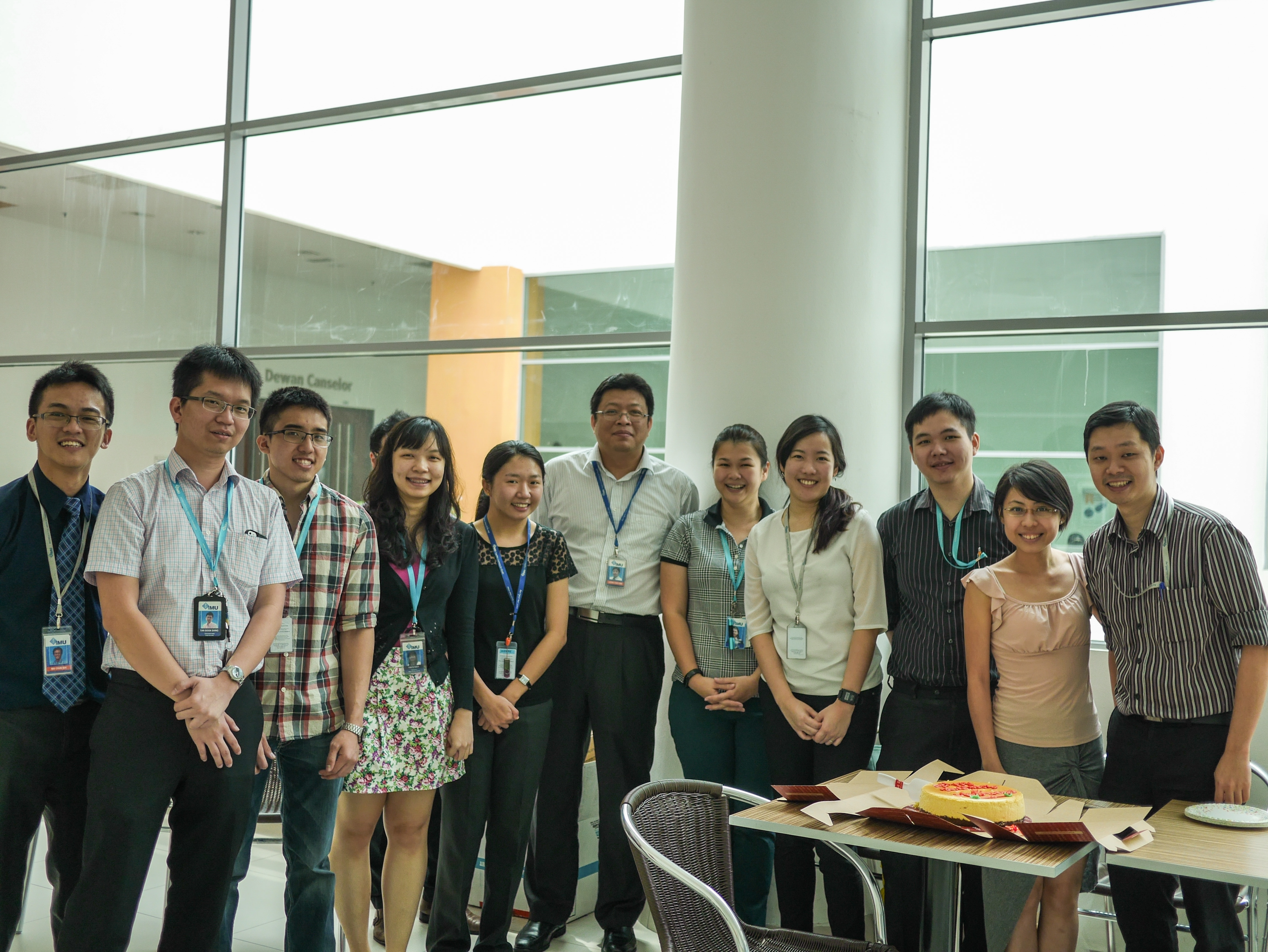
She added, “Though life as a BPharm student may be tough, tedious and tiring, having a bunch of crazy and occasionally ridiculous B107 batch mates had enlightened my life. Despite there are more than 100 of us in my cohort B107, we always managed to work as one for our cohort activities during my BPharm journey. Although we are now working at different places, we still able to keep in touch and have gathering occasionally. The friendships and bonds built with all my B107 batch mates are irreplaceable in my life.”
Name someone who inspires you and why? My parents and my husband have motivated me along my way in pursuing my further study. When I was indecisive whether to continue pursue postgraduate study, they encouraged and reminded me that learning is always lifelong, and became staunch backing of mine throughout my journey. Without their unconditional love and support, none of my success would be possible. Also, I would like to take this opportunity to express my heartiest gratitude to my dedicated supervisor, Prof Leong Chee Onn, who has inspired me in more ways than one, in every way possible. I was not only given the opportunity to learn from his expertise but also been offered broad possibilities for developing myself to the fullest in research field with my profession. With him, I managed to work with a group of committed individuals and such experience has shaped me into the person I am today. Indeed, it is my great honour to work with him along my postgraduate journey. Ling Wei tells us more about her studies: Were your studies sponsored or self-funded? Only managed to be sponsored by MyBrain for first two semesters (due to the quota set) and self-funded for subsequent semesters. Did the Semester 7 research module in your undergraduate degree help you when you started your Masters? Yes. Are the projects similar? The projects were similar as in they were both tested against cancer models. However, my undergraduate project was aimed to determine the anti-cancer effects of a natural product. Who are your supervisors for your Masters? My main supervisor was Prof Leong Chee Onn and my co-supervisors are Dr Ivan Yap and Dr Felicia Chung. From where did you get external funding for this project? Exploratory Research Grant Scheme (ERGS) RM294,000 to Prof Leong Chee Onn. Other research team members are Emeritus Prof Cheong Soon Keng (UTAR), A/ Prof Lim Yang Mooi (UTAR), A/Prof Anthony Ho Siong Hock (Taylors University) and Prof Teo Soo Hwang (Cancer Research Malaysia)




